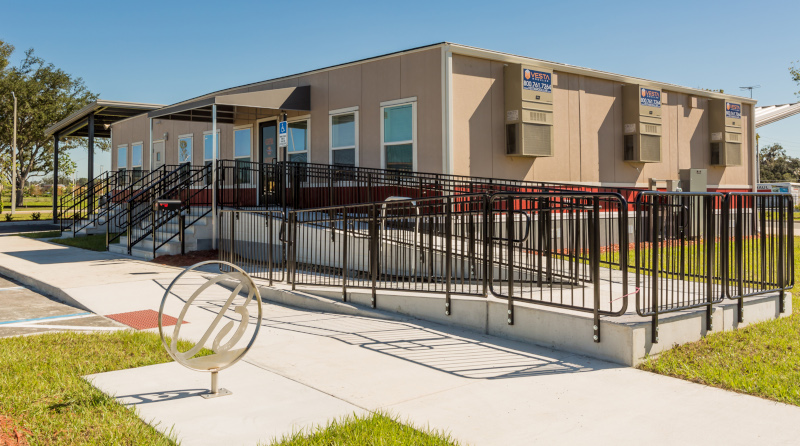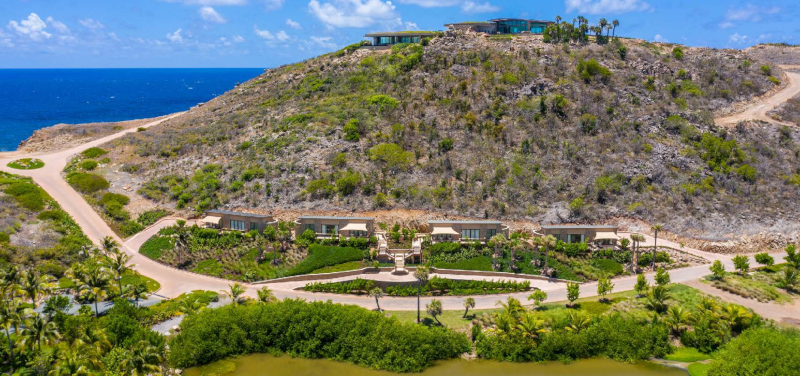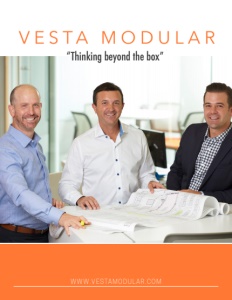Vesta Modular
“Thinking beyond the box”
Business View Magazine interviews representatives from VESTA Modular as part of our focus on new technologies in the construction sector.
VESTA has been recognized by the Inc 5000 as the fastest growing modular building company in America. Headquartered in Southfield, Michigan, VESTA operates throughout the United States through its branch network and distribution facilities. VESTA offers temporary and permanent modular building solutions, including turn-key buildings for workforce housing, office space, education, storage, hospitality, medical, and many more project types. Its team has performed all types of projects from Alaska to the Caribbean. With a high success rate of delivering quality projects, VESTA lives by the motto of “Thinking Beyond the Box.”
Recently, Business View Magazine spoke with Company Founders, CEO, Daniel McMurtrie, and Chief Operating Officer, Billy Hall, to find out more about VESTA’s origin, its offerings, and its plans for the future. The following is an edited transcript of that conversation.

BVM: Can you talk about how the company came about?
McMurtrie: Both Billy and I are originally from Michigan; Billy, a commercial general contractor and my first career was as a lawyer in Chicago. In 2008, I moved back to Michigan and took an in-house attorney position for a company called Champion Home Builders, which is a manufactured housing company. Its core business was single-family, residential, manufactured housing. Right after I got there, the company went bankrupt and was acquired by private equity funds in a bankruptcy sale. As part of that process, they redefined some of the strategic direction of Champion; the new investors wanted to focus on using manufactured housing plants that were used for building single family homes and see if they could build more complicated projects using a modular process. The basic concept was to build as much of a building offsite in a factory, then ship it to the end location, stack it up like Legos, and finish it out.
“After the bankruptcy, I transitioned from being a lawyer to leading the commercial division of Champion that was focused on doing that type of modular construction work, and the first person I hired was my partner, Billy. At that time, we were the manufacturer; Champion had 30 manufacturing plants throughout the U.S, Canada, and the UK, and we were using those plants to build modular buildings. We grew that division of Champion into a fairly large commercial modular builder, building $50-60 million of product, every year, throughout North America – everything from chain hotels; ‘man camps,’ which are remote worker housing in the middle of nowhere; to apartment buildings and assisted living facilities – just about anything you can imagine that can be built using a modular method.”
Hall: “I grew up in the site-built construction world. My grandfather started the business in the ‘50s. In 2011, I saw where things were going in the construction industry and the opportunity to do something more innovative peaked my interest – more to the modular, ‘off-site,’ means and methods versus the traditional site-built techniques. I was looking for an opportunity and Champion was looking to grow that group. I met Dan, and with my background in construction and Dan understanding the business side of it, it was a good mix. We hit it off and played off each other’s strengths and weaknesses and were able to grow that group, quickly.
“We got to a point, in 2014, where we saw a huge need in the industry: what was being built in the factory, and what the end customer desired, had a major ‘scope gap.’ (Scope gaps occur when a portion of a building process is not being covered competently by one of the relevant contractors.) In our situation, Modular Manufacturers wanted to wash their hands of the project when the modules left the factory and there was no one to take the modules, assemble them properly, and truly deliver what the end customer wanted. We saw an opportunity to take control of the entire building process and formed VESTA with the goal of providing customers a single point of contact for all their modular building needs for these projects.”
McMurtrie: When we were at Champion, we grew that business from just a few people to, maybe, 20. It happened pretty quickly and over three or four years, we realized the industry needed somebody to actually take the modular product from a factory, deliver it to the site, set it up, install it, finish it, and hold the customer’s hand throughout that process. So, we decided to leave Champion and start VESTA. We founded the company in November, 2014, and we were initially backed by a small, private equity fund, which was made up of five high net-worth families that pooled their money together to invest in new businesses (Simon Group Holdings out of Birmingham, MI). We were their first investment and over the next three or four years, we grew that business from two guys to 60 employees and $60 million in revenue.
“In November of 2018, Billy and I teamed up with a new private equity fund out of California called Balmoral Funds. We did a management buyout of our business from our original investors, and brought in new partners with the goal of continuing to grow the business on a larger scale. So, as we sit here today, it’s our five-year anniversary, and we’ve grown pretty quickly, and now we’re in a process of looking to grow quite a bit more in the next couple of years.”

BVM: What are VESTA’s service offerings?
McMurtrie: “Today, the company does two things; the first is we build permanent modular structures to customers who want to buy a structure – anything from a small office to a multi-story apartment building. We’ll act as general contractor on the whole project. The other big part is we own a fleet of about 3,000 buildings that we lease to customers across North America. Those buildings are predominantly temporary classrooms, temporary offices, medical facilities, disaster response, storage, energy, remote housing – all those things where a temporary solution is needed. So, we’re sort of like a Hertz rental car in that sense. We don’t have cars, we have buildings.”
Hall: “When we were at Champion, we were the manufacturer. Today, we source our production from several trusted factories. We are the Modular General Contractor/Developer of the building and often the owner of the assets. With office locations in Houston, Miami, and Atlanta, and our headquarters in Michigan, we have a wide-spread footprint to reach many hot markets. The benefit in working with us is we will put together the scope of work, engineering, hire the factory that will build it, and then turnkey to the customer. We guide the manufacturer as to what needs to be built, and then handle it from soup to nuts. To the customer we are simply a seamless, turnkey solution.”
BVM: What is the extent of the company’s geographic footprint?
McMurtrie: “We’ve done projects from the North Slope of Alaska to the Bahamas, and everywhere in between. Last year, we did a project for BP, where we took a large facility that was located in Saskatchewan, Canada, disassembled it, and took it through Lake Superior and the St. Lawrence Seaway, all the way down to St. Croix. I think we are one of the few companies worldwide that could pull that off in fewer than six months.”
BVM: How does VESTA compete?
McMurtrie: “We own about 3,000 units, nationwide. The largest competitor in the space is a company named Williams Scotsman and they bought the second and third largest competitors last year. So, they currently control about half of the market (about 200,000 units). So, they’re 70 times our size when it comes to leasing modular buildings, but that doesn’t mean we don’t compete toe-to-toe with them. What makes us unique is we probably did as much in projects last year as any competitor. We have a lot of in-house expertise from engineering, project management, and technical expertise that most of the competition doesn’t want to pay for. We have a deep bench of production and site build professionals, which is expensive to have. But that allows us to build permanent buildings on man-made islands in the Caribbean, or the workforce camp for BP in St. Croix, or multi-story housing in places where other people simply can’t. When it comes to sales of modular projects, we’re probably the biggest, or close to it. We’re unique in the sense that we can build customers a major, permanent building while also leasing them temporary space and storage during that construction process.”
Hall: “We have two divisions of the company: the temporary, which is the leasing of the 3,000 buildings in our fleet – that’s kind of the core bread and butter of the business. And the other, the major project work, the permanent buildings, for which we do the turnkey contracting, is more complicated where we’re typically working with the architect, the owner, or a construction manager.”
McMurtrie: “An example: we did a school project for a STEM school in Michigan a couple of years ago. They had an existing school and they wanted to renovate it and add on an additional wing. While they were renovating the school, we provided temporary classrooms that they leased from us; then we built their additional permanent wing, using modular units from a factory that we assembled and finished on site. So, we did both of our offerings on one project site – we leased the buildings and built them a new permanent modular structure at the same time.”
BVM: How does VESTA go to market?
Hall: “Referrals and word-of-mouth are a big part of it. By doing good work for customers we get a lot of leads, that way. We’ve earned the trust of a lot of our clients for successfully completing large-scale, complicated projects.”
McMurtrie: “We also do digital marketing: SEO, page optimization, Google and Facebook ads. But most of our work comes from existing customers because of our track record of being able to do projects in remote and difficult locations. We get calls more often than we call upon.”
BVM: Anything new on the horizon for the company?
McMurtrie: “We’re looking at a couple of transformative acquisitions that would, fundamentally, change our size. On the tech side, we’re in the process of rolling out a new VESTA app for our customers that allows them to manage their modular building; it allows them to extend the lease, send it back, order additional units, pay their bill, etc. We’re also working with another company called ModuGo, which is a tech startup focused on shipping containers. The U.S. is a net importer of goods from overseas, so instead of going back empty, a lot of those shipping containers pile up. What ModuGo does is to aggregate them to allow people to buy or lease a shipping container anywhere in the U.S. through their website.”
BVM: How about the long-term?
McMurtrie: “We have two fundamental long-term goals. One is, we believe that the United States has a crisis in skilled trades because fewer and fewer people want to be plumbers and electricians, and it’s creating a significant problem when it comes to getting major construction work done. We will look five years from now and see that VESTA was on the front side of the transition from traditional construction to modular construction because modular construction opens the door to being able to do more with fewer people. And when we look back, five years from now, we’ll say, ‘Why isn’t every chain hotel under four stories built modular in the U.S.? Why aren’t all assisted living facilities built modular? So, we’ll look back and see that part of our business continue to grow. It’s a macro-economic driver.
“The other thing we’ll be talking about is how VESTA is now the number one or two largest provider of rental buildings in the U.S., because I do think that’s the direction that we’re heading in, even though, right now, we’re the tenth largest. The final thing is that with ModuGo, hopefully, we are in the front side of a greener recycling initiative that uses shipping containers as core building products and storage facilities instead of letting them languish in harbors and shipyards. A shipping container in your backyard will last twice as long as a shed and cost half as much. So, there are a ton of opportunities in that space, and time will tell.”
BVM: Any other points about VESTA that you want our readers to know?
McMurtrie: “One of the things that I’m most proud of is that there were two guys working underneath a staircase in a basement three-and-a-half years ago, and this year, we were named the 36th fastest growing company in the country; the fastest growing construction company in the country; and the fastest growing company in Michigan by Inc. 5000. So, we’ve had meteoric growth. And we’ve been lucky with our financial partners; we’d be nowhere without them.”
Hall: “And the fact that we’ve been able to achieve a lot of successful projects in a short time frame. And we’ve taken it a step further with our capabilities and in-house expertise. We really are changing the way the modular industry is viewed and the way in which we build throughout the world.”
AT A GLANCE
WHO: VESTA Modular
WHAT: A manufacturer and leaser of modular buildings
WHERE: Southfield, Michigan
WEBSITE: www.vestamodular.com



